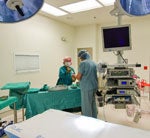Day of Surgery
 All Patients
All Patients
- Bathe or shower before surgery.
- Do not take your insulin or diabetes pill.
- Unless instructed otherwise by your anesthesiologist or surgeon, you should take your heart, blood pressure, seizure, or asthma medicine with two tablespoons of water. If you are unsure about whether or not you should take your regular medications, please speak with your physician or Surgery Center nurse.
- Make sure you arrive at the Surgery Center at the arrival time. This is different than your surgery time, typically 11⁄2 to 2 hours in advance.
- Wear loose, comfortable clothes.
- Remove contact lenses.
- Do not wear nail polish or makeup.
- If you have asthma, bring your inhaler with you.
- Leave valuables at home, including jewelry, piercings and money. You will be asked to remove all jewelry before surgery.
- Bring a list of all medications, including dosages, that you take on a regular basis. Inform your nurse if you have taken blood thinner medications (Plavix, Heparin, Coumadin, Lovenox) within the last month prior to surgery.
- Upon registration, you will be asked for a picture ID for verification and your insurance card.
While in the pre-op area you will be allowed two visitors.
We ask that children not be left unattended in the reception area.
You will be asked to sign a surgical consent prior to surgery. If the patient is a minor, a parent or legal guardian must be present to sign the consent.
Proof of legal guardianship must be provided. Also, prior to surgery, your anesthesiologist will meet with you in the pre-operative waiting area to discuss your plan of care.
As part of our ongoing efforts to ensure the utmost safety for our patients, you may be asked the same questions by more than one caregiver.
The staff responsible for your care will verify who you are, what kind of surgery you are having, and the part of your body on which surgery is to be performed. You will be asked these questions many times. Staff will also double-check what you tell them against the documents from your doctor's office. While it might seem redundant, it is an important part of our quality assurance process.
Depending on the type of surgery you are having, you and a member of your health care team will mark the correct location on your body on which the procedure is to be performed. Site marking is a critical step to ensure your safety and preventing errors, especially if you are having surgery on one of your arms, legs, hands, fingers, eyes, ears, etc.
Just before the surgery begins, the entire surgical team will take a "time out." During this time out, the members of the team assure that they are performing the correct procedure at the correct site and on the correct person.